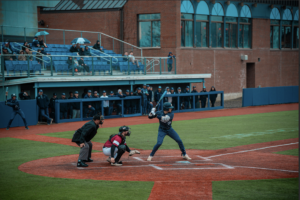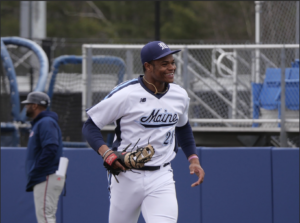On Sept. 22, 2022, the MLB announced a new rule that the following season, in 2023 that they would be implementing a new mechanic, the pitch clock, in an attempt to cut down game time.
How the pitch clock works is when there is no batter on bases, the pitcher has 15 seconds between pitches once they receive the ball from the catcher, and while there is a runner on base, they have 20 seconds per pitch. If a pitcher fails to get a pitch off within the time frame, a ball will be awarded to the hitter. While at it, the batter also has a timer being seven seconds to get into a stance. Otherwise, a strike is called.
The main reason behind the rule addition has very little to do with the on-field product and more to do with the run time of games. During the 2022 regular season, the average game lasts three and a half hours. During that same year, the minor leagues implemented this rule the games were shortened by 26 minutes.
On opening day alone, there were 14 called pitch clock violations in the 15 games played, more than likely due to the adjustment. Interestingly enough, stolen bases were up drastically on the same day, winning 21 out of 23 attempts compared to five out of nine from last season. This will be an interesting correlation to watch moving forward.
It took all of one day for the first pitch clock violation to occur when in the third inning of the Chicago Cubs vs. Milwaukee Brewers opening day matchup, Cubs pitcher Marcus Stroman was called for a pitch clock violation at the top of third while facing Christian Yelich as he was distracted by the runner on second Brice Turang. The violation did not affect anything as Chicago rolled to a 4-0 win.
While Stroman’s violation did not have much impact, the same could not be said for Boston Red Sox star third-baseman Rafael Devers, who became the first player in history to ever strike out due to the pitch clock after hitting a foul ball into the outfield against the Baltimore Orioles in their 10-9 loss. However, this would not escape controversy as Devers was in the box but was not looking at the pitcher and was called out.
But like any rule, there will be controversy, as we saw recently with Chicago Cubs center fielder Cody Bellinger being called for one during his first at-bat back in Los Angeles, where he was a main contributor to their 2020 World Series win. At his first bat, the fans gave him a standing ovation though the moment ended when he was called for a violation.
From opening day onward, baseball has seen a drastic change in the length of games as opening day averaged two hours and 45 minutes, down from the three hours and 11 minutes from last year. So while the MLB has gotten exactly what they wanted out of the rule change, one could argue that the umpires should be more lenient on the clock so the Bellinger incident does not happen again, but that is for the executives to decide.







